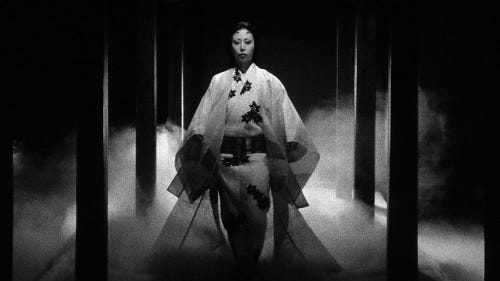No Sleep October: Kuroneko (1968)
I have never watched anything quite like “Kuroneko,” a visually stunning adaptation of an old Japanese folktale about wronged women getting their revenge from beyond the grave.

Two women, Yone (Nobuko Otowa) and Shige (Kiwako Taichi), live alone in a bamboo grove while Hachi (Nakamura Kichiemon II) — Yone's son and Shige's husband — is at war. A roving band of soldiers happens upon them, brutally rapes and murders them, and burns down their hut.
As they die, a black cat licks their bodies. Soon, samurai from the nearby city of Rajomon start dying, lured into the bamboo grove by fine ladies clad in white. Their throats are ripped out, as if by a large cat. Hachi returns from war, is promoted to samurai and told to hunt down and vanquish the ghost haunting the city. When he finds out the ghost is, in fact, his wife and mother, well — that's the story, isn't it?
My experience with this era of Japanese cinema is embarrassingly limited to movies by Kurosawa and anything featuring kaiju, so I wasn't sure what to expect when we started “Kuroneko.” I was pleasantly surprised by the eeriness. There's nothing particularly scary; the special effects are about on the level of a Universal monster movie, as are the editing techniques to show transformations, gore, etc. But it is eerie, with a folktale's simple and straightforward construction allowing for outsized importance on the camerawork, the lighting, the sound design.
The women are depicted as blinding white against the pitch-black darkness of night, angels of death who are decidedly ghostly. Their tense seduction of each samurai they entrap is played out slowly. As one completes the deed, the other dances, the music ponderous; in some ways, it made me think of "Eraserhead." Very few words are spoken; silence, sound and ambience carry the day here.
The title “Kuroneko” apparently translates to “A Black Cat in a Bamboo Grove,” but the actual identity of the two ghost women is a little weirder and less straightforward to me. It's perfect in the way that most folklore is built on assumptions and understandings of the world and magic that simply aren't universal. I wonder if the idea of cats having this ability was prominent at one point in feudal Japan? I should do more research.
Additionally, it's not terribly common for a ghost story about vengeance to include a heart-shattering love story and ultimate revenge. Most of the movie triggered a pleasant dissonance that added to the enjoyment and made me curious to learn more about the world in which the lore was first told.
I came across “Kuroneko” at my local library while browsing their horror selections, and chose it because it was different from anything else on my list. I was pretty happy with it. It isn't scary in the traditional sense, but seeing horror through a different lens, intellectually and emotionally engaging with something alien to me, was a welcome respite from being downright terrified.


